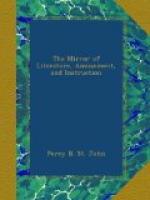The third Cut is the Monkey House, of substantial iron-work, with dormitories and winter apartments in the rear. In fine sunny weather the monkeys may be here seen disporting their recreant limbs to the delight of crowds of visiters. Their species are too numerous but for a catalogue. Among them are the Negro and Sooty Monkeys,—the Mone Monkey: “the name of Monkey is supposed to be derived from the African appellation of this species, Mone corrupted into Monachus.” Bonneted, pig-tailed, and Capuchin Monkeys; the last named from their dark crowns, like the capuch or hood of a Capuchin friar; and black and white-fronted Spider Monkeys, named from their great resemblance to large spiders.
By the way, there is an abundance of still life in the Gardens at this ungenial season. We find the Elephant, the Antelopes, and the Zebra, in their winter quarters, and their mightinesses, the large cats, as the lions, tiger, and leopards, accommodated with a snug fire. The tropical birds, as the parrots, maccaws, &c., have been removed from the extremity of the north garden to warmer quarters; and the hyaenas, leopards, and a host of smaller carnivorous quadrupeds have taken their places. The upper end is occupied by four roomy dens, with a lordly black-maned lion and a lioness, from Northern Africa; above them are a fine lioness and a leopard from Ceylon: these we take to have been among the recent arrivals from the Tower Menagerie.
* * * * *
FRAGMENTS ON HUMAN LIFE.
(For the Mirror.)
“Call not earth a barren spot,
Pass it not ungrateful by,
’Tis to man a lovely lot.”
There is no subject on which such a variety of opinions exist, as on the question “Whether man is happy;” and that it is not easy to be settled, is certain. Many persons have been so far contented with their lot as to wish to have their life over again, and yet as many have expressed themselves to the contrary.
Dr. Johnson, who always spoke of human life in the most desponding terms, and considered earth a vale of tears,
“Yet hope, not life from pain or
sorrow free,
Or think the doom of man reversed for
thee—”
declared that he would not live over again a single week of his life, had it been allowed him.[2] Such was his opinion on the past; but so great is the cheering influence with which Hope irradiates the mind, that in looking forward to the future, he always talked with pleasure on the prospect of a long life.
[2] Chamfort observes, that
the writers on physics, natural
history,
physiology, and chemistry, have been generally men
of a
mild,
even, and happy temperament, while the writers on politics,
legislation,
and even morals, commonly exhibited a melancholy and
fretful
spirit. It is to be expected that an inspection
of the
beauty
and order of nature should affect the mind with peculiar
pleasure.—Gaieties
and Gravities.




